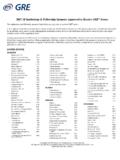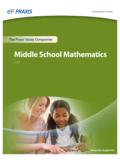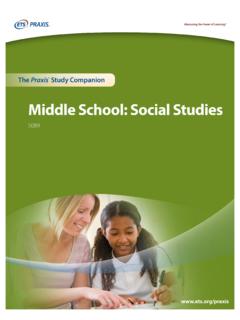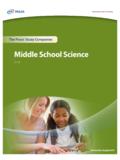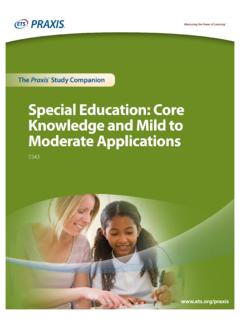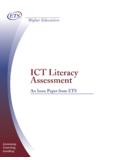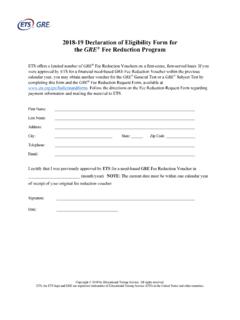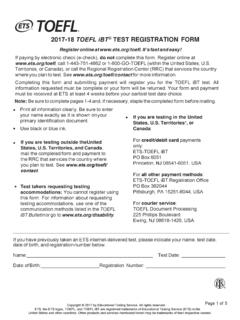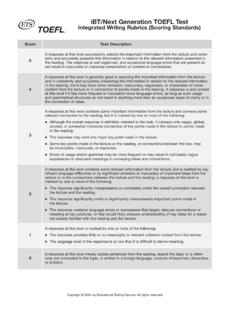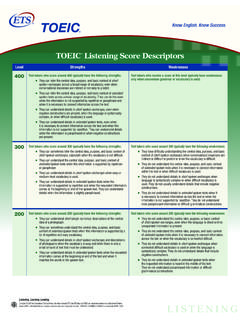Transcription of Earth and Space Sciences: Content Knowledge
1 Earth and Space sciences : Content Knowledge Praxis Study CompanionThe Praxis Study Companion2 Welcome to the Praxis Study CompanionWelcome to The Praxis Study Companion Prepare to Show What You KnowYou have been working to acquire the Knowledge and skills you need for your teaching career. Now you are ready to demonstrate your abilities by taking a Praxis test. Using the Praxis Study Companion is a smart way to prepare for the test so you can do your best on test day. This guide can help keep you on track and make the most efficient use of your study Study Companion contains practical information and helpful tools, including: An overview of the Praxis tests Specific information on the Praxis test you are taking A template study plan Study topics Practice questions and explanations of correct answers Test-taking tips and strategies Frequently asked questions Links to more detailed informationSo where should you start?
2 Begin by reviewing this guide in its entirety and note those sections that you need to revisit. Then you can create your own personalized study plan and schedule based on your individual needs and how much time you have before test in mind that study habits are individual. There are many different ways to successfully prepare for your test. Some people study better on their own, while others prefer a group dynamic. You may have more energy early in the day, but another test taker may concentrate better in the evening. So use this guide to develop the approach that works best for teaching career begins with preparation. Good luck!Know What to ExpectWhich tests should I take? Each state or agency that uses the Praxis tests sets its own requirements for which test or tests you must take for the teaching area you wish to you register for a test, confirm your state or agency s testing requirements at are the Praxis tests given?
3 Praxis tests are given on computer. Other formats are available for test takers approved for accommodations (see page 40).The Praxis Study Companion3 Welcome to the Praxis Study CompanionWhat should I expect when taking the test on computer?When taking the test on computer, you can expect to be asked to provide proper identification at the test center. Once admitted, you will be given the opportunity to learn how the computer interface works (how to answer questions, how to skip questions, how to go back to questions you skipped, etc.) before the testing time begins. Watch the What to Expect on Test Day video to see what the experience is and when are the Praxis tests offered?You can select the test center that is most convenient for you.
4 The Praxis tests are administered through an international network of test centers, which includes Prometric Testing Centers, some universities, and other locations throughout the schedules may differ, so see the Praxis web site for more detailed test registration information at The Praxis Study Companion4 Table of ContentsTable of ContentsThe Praxis Study Companion guides you through the steps to success1. Learn About Your Test ..5 Learn about the specific test you will be taking2. Familiarize Yourself with Test Questions ..11 Become comfortable with the types of questions you ll find on the Praxis tests3. Practice with Sample Test Questions ..15 Answer practice questions and find explanations for correct answers4.
5 Determine Your Strategy for Success ..23 Set clear goals and deadlines so your test preparation is focused and efficient5. Develop Your Study Plan ..26 Develop a personalized study plan and schedule6. Review Study Topics ..30 Detailed study topics with questions for discussion7. Review Smart Tips for Success ..38 Follow test-taking tips developed by experts8. Check on Testing Accommodations ..40 See if you qualify for accommodations that may make it easier to take the Praxis test9. Do Your Best on Test Day ..41 Get ready for test day so you will be calm and confident10. Understand Your Scores ..43 Understand how tests are scored and how to interpret your test scoresAppendix: Other Questions You May Have ..45 The Praxis Study Companion5 Step 1: Learn About Your Test1.
6 Learn About Your TestLearn about the specific test you will be takingEarth and Space sciences : Content Knowledge (5571)Test at a GlanceTest Name Earth and Space sciences : Content KnowledgeTest Code 5571 Time hoursNumber of Questions 125 Format Selected-response questionsTest Delivery Computer delivered Approximate Approximate Content Categories Number of Percentage of Questions Examination I. Basic Principles and Processes 15 12% II. Tectonics and Internal Earth Processes 21 17% III. Earth Materials and Surface Processes 29 23% IV. History of the Earth and its Life-Forms 17 14% V. Earth s Atmosphere and Hydrosphere 24 19% VI.
7 Astronomy 19 15%VIVIVIIIIIIA bout This TestThe Earth and Space sciences : Content Knowledge test is designed to measure the Knowledge and competencies necessary for a beginning teacher of secondary school Earth and Space Science. Examinees have typically completed or nearly completed a bachelor s degree program with appropriate coursework in Earth and Space Science topics and education. This test may contain some questions that will not count toward your development of the test questions and the construction of the test reflect the National Science Education Standards (NSES) and the National Science Teacher Association (NSTA) standards and recognize that there are conceptual and procedural schemes that unify the various scientific disciplines.
8 These fundamental concepts and processes (systems, models, constancy and change, equilibrium, form and function) are useful in understanding the natural world. Insofar as possible, then, the test questions have the primary objective of evaluating the Content areas by using questions that focus on conceptual understanding, critical thinking, and problem solving in science. The test Content is developed and reviewed in collaboration with practicing high school Earth and Space science teachers, teacher-educators, and higher education Content specialists to keep the test updated and representative of current 125 selected-response questions include concepts, terms, phenomena, methods, applications, data analysis, and problem solving in Earth and Space Science, and include an understanding of the impact of science and technology on the environment and human affairs.
9 The topics are typically those covered in introductory college-level Earth and Space science courses, although some questions of a more advanced nature are The Praxis Study Companion6 Step 1: Learn About Your Testincluded, because secondary school teachers must understand the subject matter from a more advanced viewpoint than that presented to their students. The test covers the six broad Content areas of basic scientific principles and processes, tectonics and internal Earth processes, Earth materials and surface processes, history of the Earth and its life-forms, Earth s atmosphere and hydrosphere, and will not need to use calculators in taking this test. The periodic table of the elements is available as a Help screen, along with a table of information that presents various physical constants and a few conversion factors among SI units.
10 Whenever necessary, additional values of physical constants are included with the text of a SpecificationsTest specifications in this chapter describe the Knowledge and skills measured by the test. Study topics to help you prepare to answer test questions can be found on page Basic Scientific Principles and ProcessesA. Science Methodology, Techniques, and History1. Scientific inquiry methodsa. Observations, hypotheses, experiments, conclusions, theories, models, and lawsb. Experimental design, including variables, controls, and sources of errorc. Scientific Knowledge is consistent with evidence, subject to change2. Collect, evaluate, process, interpret, and report dataa. Units of measurementb. Scale (orders of magnitude), uncertainty in measurement, accuracy versus precisionc.
